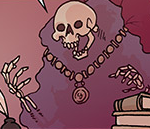|
AlphaDog posted:None of these scenarios is the wrong or right way to play. A player has no way to tell, during play, if the orcs they just fought were pre-placed, generated by a table, or made up on the spot. I feel this is either giving players basically zero credit or assuming some really godlike GMing (or I guess a third option where players notice but don't say anything when asked because they think it'd be rude I guess). I'm not a great GM. I'm good enough to come up with encounters that are fun and NPCs that are memorable, but improv is hard - and I even studied improv for a few years and roleplay all the gosh darn time... and it's really freakin' easy for my players to notice that, when they do something unexpected, or roll badly doing something expected, or whatever, I stutter for a minute or even say "okay, I didn't expect that, everyone take 5 to get some coffee and pee while I figure something out so it's worth our time." Maybe if you only play text-based online games it isn't obvious but skype games, irl games, or even things like Roll20 sometimes it's pretty obvious when the GM plops some oddly-shoddy looking tokens on the board after someone does something weird. My point is, I think failing forward is great, but I don't think we need to pretend like people are just like completely unable to figure out when the GM is stumped for a minute unless everyone just plays with much better GMs than I do or never actually does things unexpected in the first place.
|
|
|
|

|
| # ? May 15, 2024 04:23 |
|
That Old Tree posted:This the exact same bullshit speculation that grogs do in reverse. Plenty of people also legit play with meticulous planning and notes and poo poo. Don't pretend other people don't play just because they don't play like you. They're assholes for acting like a particular method is "not real gaming", not because of basic personal preference. I know people play with different levels of planning. There is nothing wrong to hyper plan. But, to pretend GMing is only real if EVERY SINGLE DETAIL is planned out, is downright unrealistic and impossible.
|
|
|
|
Actually, thinking about it more, some of the reason it may be more obvious when I make up something or hastily reskin an existing encounter is because I tend to play more mechanically crunchy systems than are favored by a lot of people in this thread. It's at least a bit easier to make things sound like it was planned all along when you don't have to worry about setpiece encounters with complex tactics or what have you, and instead have much simpler conflict resolution mechanics which don't require flipping through a book to remind yourself what abilities something is supposed to have, or if it makes sense for a certain type of soldier to be carrying that type of weaponry, or whatever. This probably plays into some of the fear from people who dislike the system - the realization that it's more difficult to "fall forward" into coherent, mechanically dense and satisfying ideas at the drop of a hat, and that this would lead to less satisfying encounters or interactions. There's probably some element of truth here too, but probably not enough to warrant significant backlash against the idea.
|
|
|
|
Countblanc posted:I feel this is either giving players basically zero credit or assuming some really godlike GMing (or I guess a third option where players notice but don't say anything when asked because they think it'd be rude I guess). Fourth option: Most players don't try to peek behind the curtain because they only experience the game world as they interact with it and it makes literally no difference if something was pre-placed, randomly rolled, or ad-libbed. Countblanc posted:I'm not a great GM. I'm good enough to come up with encounters that are fun and NPCs that are memorable, but improv is hard - and I even studied improv for a few years and roleplay all the gosh darn time... and it's really freakin' easy for my players to notice that, when they do something unexpected, or roll badly doing something expected, or whatever, I stutter for a minute or even say "okay, I didn't expect that, everyone take 5 to get some coffee and pee while I figure something out so it's worth our time." Maybe if you only play text-based online games it isn't obvious but skype games, irl games, or even things like Roll20 sometimes it's pretty obvious when the GM plops some oddly-shoddy looking tokens on the board after someone does something weird. I've never felt that players could tell the difference between me saying "hang on a sec" while reading a paragraph about what happens next from the module and me saying "hang on a sec" while I make up what happens next. Maybe it's because I like to have a small number of pre-prepared encounters to drop into the game if I feel like an encounter is required, so it's not like I'm usually saying "go away and come back in ten minutes after I make some stuff up". I never thought I was particularly quick at ad-libbing stuff that's not a combat encounter, but maybe I am? By the time I'm halfway through reading a pre-written description of "If x happens, then the following..." I could have made something up and started describing it. Countblanc posted:Actually, thinking about it more, some of the reason it may be more obvious when I make up something or hastily reskin an existing encounter is because I tend to play more mechanically crunchy systems than are favored by a lot of people in this thread. It's at least a bit easier to make things sound like it was planned all along when you don't have to worry about setpiece encounters with complex tactics or what have you, and instead have much simpler conflict resolution mechanics which don't require flipping through a book to remind yourself what abilities something is supposed to have, or if it makes sense for a certain type of soldier to be carrying that type of weaponry, or whatever. That makes a whole lot more sense to me! My system for crunchier games is to pre-prepare encounters, and then use them if an encounter seems like a good idea. But I've seen people object to that too, on the ground that "but those aren't things that exist in the world, you're just putting them in wherever", which is what I was describing as dumb - there's no in-play difference between an encounter that was pre-written and placed on the map, an encounter that was pre-written and randomly rolled for, and an encounter that was made up on the spot. When I say "made up on the spot", what I mean is that there's no roll for the encounter, and the encounter isn't pre-placed. That doesn't mean I'm busting out the encounter building rules, just that I'm dropping (let's say) a roughly appropriate encounter of four orcs somewhere in the forest full of orcs, and describing the area it happens in. I dunno, I can do that pretty quickly. There's probably a four orc encounter written down somewhere in my notes, and describing and sketching a map of the area on my whiteboard grid isn't any slower than reading out the area description from notes and then drawing the map from the notes onto the whiteboard. VVVV like that, yeah. E: Thing is, games pause all the time. If I pause for more than 5-10 seconds, someone's gonna say "GM loading..." or something, but nobody has ever given a single poo poo about what's actually going on behind the screen. Have I paused while I consult tables? While I flip frantically between the room's description on page 5 of the module and the list of things the bad guy might do in an ambush on page 47 of the module? While I search though old encounters trying to find the page with the owlbear and the goblins? I don't know that I'd want to play with someone who would actively try to figure out what exactly was happening in case it was something they didn't like, because anyone who does that is going to find something they don't like eventually. Elector_Nerdlingen fucked around with this message at 02:15 on Jul 7, 2017 |
|
|
|
Countblanc posted:Actually, thinking about it more, some of the reason it may be more obvious when I make up something or hastily reskin an existing encounter is because I tend to play more mechanically crunchy systems than are favored by a lot of people in this thread. It's at least a bit easier to make things sound like it was planned all along when you don't have to worry about setpiece encounters with complex tactics or what have you, and instead have much simpler conflict resolution mechanics which don't require flipping through a book to remind yourself what abilities something is supposed to have, or if it makes sense for a certain type of soldier to be carrying that type of weaponry, or whatever. I also keep a sheet full of assorted easily reskinned monsters in of assorted types in case I need a quick encounter. I just punch in how many hit dice it should have and the spreadsheet fills in everything else. 1 second, 1 stat block!
|
|
|
|
Man, I used to adhoc encounters in GURPS, if you know what you're doing there's nothing stopping you from throwing a handful of adversaries together, quick fake up an area description (or use one you already had), and run from there no matter how crunchy the system is. It's all about knowing the break points for what makes a balanced encounter for your group, which admittedly is a form of system mastery in most systems but you're the GM, you're the one who adjudicates the rules, it's your job to have system mastery. I'm not going to say there's anything wrong with sticking to a prepared module, but unless you have the world's most boring players it's going to go off the rails eventually so you need to be able to improvise at least a little. Pretty much all my one-shots back when I was doing Uncle Kwyndig's Storygame Time were a hundred percent improv, and that was a different game each week. Man, I should bring back #UKST. Give me an excuse to use some of these games I've got piling up.
|
|
|
|
Fail forward is bad because post-decision randomness in general is bad. More seriously, it kind of depends on exactly what you mean by fail-forward. For narrative stuff like "either you pick the lock silently and get in or you wake up a guard and engage in a wild pursuit, but either way you progress the story" I can't think of any good reason to disapprove of it, but I'm also not really that invested in the narrative side of tabletop gaming to begin with, so I might have overlooked something. On the combat level, though, if you mean fail forward in the sense of "either you deal 2 damage and stun the enemy on a hit, or you just deal 2 damage on a miss." I can see a few legitimate objections. One of the few advantages of random outcomes in combat is that it promotes the need to have contingency plans, and if you dilute the significance of a miss -- if the player can still rely on something fairly significant happening even on a failure -- then you restrict the need for contingencies. I can see how a group that's really invested in the team aspect of the game rather than their individual character might dislike that. (Or maybe their character is the one who really shines when things go wrong, e.g. the healer.) Tuxedo Catfish fucked around with this message at 03:36 on Jul 7, 2017 |
|
|
|
Tuxedo Catfish posted:On the combat level, though, if you mean fail forward in the sense of "either you deal 2 damage and stun the enemy on a hit, or you just deal 2 damage on a miss." I can see a few legitimate objections. One of the few advantages of random outcomes in combat is that it promotes the need to have contingency plans, and if you dilute the significance of a miss -- if the player can still rely on something fairly significant happening even on a failure -- then you restrict the need for contingencies. I can see how a group that's really invested in the team aspect of the game rather than their individual character might dislike that. (Or maybe their character is the one who really shines when things go wrong, e.g. the healer.) "The result is always that something significant happens" isn't supposed to be the same as "the result is always that something good happens". The idea is not that you always succeed, but that the result of rolling is never "Nothing happened. Next?" Fail forward in combat might look something like this: Poor result: Miss, choose negative effect. Average result: Your choice of (hit + choose negative effect) or (miss + choose positive effect) Good result: Hit, choose positive effect. Negative effects might be restricted movement, taking a small amount of damage, dropping or breaking an item, etc. Positive effects might be a small bonus to damage or AC, healing a small amount of damage, etc. e: But I'm really not sure if exactly the same philosophy should apply in and out of combat, because "you miss" might be kinda boring and poo poo, but it's not poo poo on the same level as "welp, nobody can climb this cliff, guess we're going home". Elector_Nerdlingen fucked around with this message at 04:05 on Jul 7, 2017 |
|
|
|
Tuxedo Catfish posted:On the combat level, though, if you mean fail forward in the sense of "either you deal 2 damage and stun the enemy on a hit, or you just deal 2 damage on a miss." I can see a few legitimate objections. One of the few advantages of random outcomes in combat is that it promotes the need to have contingency plans, and if you dilute the significance of a miss -- if the player can still rely on something fairly significant happening even on a failure -- then you restrict the need for contingencies. I can see how a group that's really invested in the team aspect of the game rather than their individual character might dislike that. (Or maybe their character is the one who really shines when things go wrong, e.g. the healer.)
|
|
|
|
Covok posted:I know people play with different levels of planning. There is nothing wrong to hyper plan. But, to pretend GMing is only real if EVERY SINGLE DETAIL is planned out, is downright unrealistic and impossible. Okay, yes, and I didn't say anything against that. I was responding specifically to people going "I bet these grogs don't even really play
|
|
|
|
AlphaDog posted:e: But I'm really not sure if exactly the same philosophy should apply in and out of combat, because "you miss" might be kinda boring and poo poo, but it's not poo poo on the same level as "welp, nobody can climb this cliff, guess we're going home". If combat is sufficiently threatening, then missing and you don't achieve your goals is dramatic enough. The recent XCom games work on exactly the principle I'm describing; missing means the alien you were shooting at is still alive, and frequently, that's terrifying. Having additional negative things happen to the player on a miss is fine and kind of a slightly different issue than what I'm talking about (although you're right, that also falls under the banner of "fall forward") but making a miss naturally scary via tough enemies or extra-scary through additional consequences are both fine, and aimed towards the same goal. Tuxedo Catfish fucked around with this message at 04:11 on Jul 7, 2017 |
|
|
|
In the context of combat, at least, there's a real consequence to failure; you only have so many opportunities to kill your opponent before they kill you, so each miss is a real resource lost. It's also super boring, but at least it's functional in a way that repeatedly rolling to open a door isn't. e: One way I like handling the 'misses are boring' problem is by giving the player the opportunity to consume some other resource to succeed. A baby-steps version of that is Dark Sun 4e's rule that if you roll a 1, you can accept the miss or you can BREAK YOUR WEAPON ACROSS YOUR ENEMY'S HEAD instead. This could easily be fleshed out to a system where your die roll tells you what the price to succeed will be, and it's up to you if you're willing to pay it. Tendales fucked around with this message at 04:10 on Jul 7, 2017 |
|
|
|
Yawgmoth posted:Every combat action should do something because, as noted by many others, nothing happening is boring. I've already talked about why this isn't really true, but to also circle all the way back around to my original, semi-serious point: in that case, why bother with to-hit rolls at all?  Tendales posted:e: One way I like handling the 'misses are boring' problem is by giving the player the opportunity to consume some other resource to succeed. A baby-steps version of that is Dark Sun 4e's rule that if you roll a 1, you can accept the miss or you can BREAK YOUR WEAPON ACROSS YOUR ENEMY'S HEAD instead. This could easily be fleshed out to a system where your die roll tells you what the price to succeed will be, and it's up to you if you're willing to pay it. Especially when you start talking about a system like this. This isn't a bad idea, but it's a lot of complexity, with both the decision to pay the cost and the variable nature of the cost based on the die roll. Why not just ditch the dice and make the costs static (the simplest option, and probably the easiest to balance!) or escalate each time you use it, or based on how long the combat has lasted -- basically whichever option provides the best combination of theme and mechanics at the least overhead in complexity, book-keeping, and how long it takes to resolve. Tuxedo Catfish fucked around with this message at 04:18 on Jul 7, 2017 |
|
|
|
If you fail your lockpicking roll, that means the door you THOUGHT lead into the Treasure Room, actually leads into the Bear Room.
|
|
|
|
Tuxedo Catfish posted:Especially when you start talking about a system like this. This isn't a bad idea, but it's a lot of complexity, with both the decision to pay the cost and the variable nature of the cost based on the die roll. Why not just ditch the dice and make the costs static (the simplest option, and probably the easiest to balance!) or escalate each time you use it, or based on how long the combat has lasted -- basically whichever option provides the best combination of theme and mechanics at the least overhead in complexity, book-keeping, and how long it takes to resolve. People like rolling dice. It doesn't have to be complicated. You attack. Roll to hit. Result is over target number: Do your damage, do your effect. Result is under target number: Either do nothing, or take a penalty (roll or pick from short list, maybe 4 items long) and continue as though you'd rolled over the target number. Elector_Nerdlingen fucked around with this message at 04:35 on Jul 7, 2017 |
|
|
|
AlphaDog posted:People like rolling dice. It doesn't have to be complicated. That is complicated. Don't think about it terms of how hard it is to explain. That matters, but is secondary; you only have to learn the mechanics once, but you'll have to use them dozens of times per session. Think about it in terms of how many decisions you have to make and how many times you have to roll dice (especially rolling dice vs. a lookup table instead of just a simple calculation.) In the case you're describe, you have all the usual decisions and rolls you'd make in an RPG combat (whether to attack, who to attack, roll to-hit, etc.) but then you have to decide between doing nothing or taking a penalty, and choose or roll the penalty. If those decisions are difficult and meaningful, that might well be twice as many important decisions to make vs. the usual model. If they're easy or meaningless decisions, then maybe they don't take so long, but why have them at all?
|
|
|
|
Tuxedo Catfish posted:That is complicated. Don't think about it terms of how hard it is to explain. That matters, but is secondary; you only have to learn the mechanics once, but you'll have to use them dozens of times per session. Think about it in terms of how many decisions you have to make and how many dice you have to roll. Ok, try this then: Result over: Do your damage Result under: Do your damage, enemy also does their damage (or maybe stat blocks have a "retaliation damage" number and they do that much damage, no need to roll) (This line could just as easily read "do your damge, roll for a penalty"). Result exact: Do your damage, get a token to convert an under to an over. E: Where are you setting the bar here? I mean, anything's more complicated than "literally nothing happens". Elector_Nerdlingen fucked around with this message at 04:41 on Jul 7, 2017 |
|
|
|
Is complexity necessarily a bad thing here? You need some level of it for fail-forward to even be possible, because non-fail-forward is just a binary "you do the thing" or "you don't do the thing," whereas fail-forward requires a greater range of in-betweens by default.
|
|
|
|
AlphaDog posted:Ok, try this then: I don't think there's anything wrong with this system per se. The idea of "retaliation damage" seems like it'd promote very cautious play, because now a miss means the enemy gets to double-dip (you take damage now and again on their turn?) but maybe that suits the kind of game you're trying to make. I don't think the roll under result is any more interesting than just missing, though. From my (very gameplay-centric) perspective, it's the same. The roll exact result is cool and I think you might be on to something there -- it gives you an additional decision to make, but it's not one that you have to make very often since exact results are presumably pretty rare. Although, for the same reasons, the token is a very luck-dependent resource with a pretty big effect, especially if you used large dice.
|
|
|
|
AlphaDog posted:E: Where are you setting the bar here? I mean, anything's more complicated than "literally nothing happens". LORD OF BOOTY posted:Is complexity necessarily a bad thing here? You need some level of it for fail-forward to even be possible, because non-fail-forward is just a binary "you do the thing" or "you don't do the thing," whereas fail-forward requires a greater range of in-betweens by default. To answer both of these: the main question is how many decisions does the player have to take during their whole turn, and how long do they take to resolve. It's not like there's a sharp line where you can definitely say "this is too much" -- rather it's always a question of how much cool stuff (depth, mechanical reinforcement of themes, whatever) you can buy at the cost of how much complexity. Needless complexity is bad, though. It makes games harder to learn, harder and slower to adjudicate, and harder to balance.
|
|
|
|
How about a hit just being a hit, and miss being a miss but also getting you a token that can be spent in different amounts to do different things. Like 5 could convert a miss, 2 could heal you a bit, you could spend them for extra damage, or whatever other thing. Seems like it'd delay the decision-making until after your turn, meaning it wouldn't slow poo poo down too much because you've got all of everyone else's turn to plan.
|
|
|
|
How about the player chooses what to attack and rolls damage?
|
|
|
|
Tuxedo Catfish posted:I've already talked about why this isn't really true, but to also circle all the way back around to my original, semi-serious point: in that case, why bother with to-hit rolls at all? An unironically good question. As someone who likes robust tactical combat games I find that one of the biggest drains on time is melding the various possibilities and strategies with the "but what if I miss?" aspect which adds an additional layer of complexity and paralysis to one's analysis that frequently bogs the game down as (assuming you have a group that's into it like you are) everybody spends a ton of time ruminating over "well I could do this and this, BUT I might miss in which case...but if I succeed...but if I miss...but if I got some to-hit bonuses...but I might still miss...but if I moved here...but if I do that and miss..." Gloomhaven aptly demonstrates that you can have an engaging tactical combat game with vastly less randomness than your average dungeon crawlathon and even on the most dire of critical failures stuff will still occur, otherwise it's about as deterministic as you can get without playing Kemet.
|
|
|
|
So I was just browsing facebook and it turns out the writer of Blood in the Chocolate is a friend of a friend. Normally I'd be inclined to say hi and congrats and network/make friends. But you guys have said real bad things about that adventure. So I could instead opt simply not to introduce myself. So, uh, how bad is it? Not like how laughable and terrible would it be to run/play, since I don't have any interest in playing it in any case. Rather I'm asking how hateful and vile is it? You can rate it on a scale of 0 to 10 Desboroughs or something.
|
|
|
|
Jimbozig posted:So I was just browsing facebook and it turns out the writer of Blood in the Chocolate is a friend of a friend. Normally I'd be inclined to say hi and congrats and network/make friends. But you guys have said real bad things about that adventure. So I could instead opt simply not to introduce myself. Antivehicular posted:I'm actually impressed how predictably gross it is. I had at least hoped for some novel awfulness, but it sounds like it's grotesque in exactly the ways you'd expect and no other way, with all the non-grotesque elements just being lazy and ill-considered. Also pretty mad at that author for bragging about representation when the character in question is just evil for no reason and then rapes a woman on-camera, complete with an apparently completely unironic line about "her twisted pleasures." Predatory lesbian stereotypes ahoy! Gonna go out on a limb and guess it's pretty fuckin bad.
|
|
|
|
Tuxedo Catfish posted:How about the player chooses what to attack and rolls damage? Into the Odd does that, as I recall, and it seems to work pretty well there.
|
|
|
|
You aren't getting an Ennie award with that attitude, Mr. Jim!
|
|
|
|
Tuxedo Catfish posted:How about the player chooses what to attack and rolls damage? Oh, right. Yeah, that's fine with me. I thought you were objecting to that exact thing when you said this: Tuxedo Catfish posted:On the combat level, though, if you mean fail forward in the sense of "either you deal 2 damage and stun the enemy on a hit, or you just deal 2 damage on a miss." I can see a few legitimate objections. One of the few advantages of random outcomes in combat is that it promotes the need to have contingency plans, and if you dilute the significance of a miss -- if the player can still rely on something fairly significant happening even on a failure -- then you restrict the need for contingencies. I can see how a group that's really invested in the team aspect of the game rather than their individual character might dislike that. (Or maybe their character is the one who really shines when things go wrong, e.g. the healer.) If that wasn't what you meant then sorry for misreading you.
|
|
|
|
LeSquide posted:Into the Odd does that, as I recall, and it seems to work pretty well there. This looks pretty cool!
|
|
|
|
AlphaDog posted:Oh, right. Yeah, that's fine with me. I thought you were objecting to that exact thing when you said this: Not objecting to it -- I'm all about more deterministic models, that's my personal preference. I was just trying to come up with some good reason to have misses at all. Failing forward (in the particular, narrow sense I was talking about in that post) seems a little like a strange compromise between two models that both work better in their pure form.
|
|
|
|
Tuxedo Catfish posted:Not objecting to it -- I'm all about more deterministic models, that's my personal preference. I was just trying to come up with some good reason to have misses at all. Fail forward seems a little like a compromise between two models that both work better in their purer form. Specific to combat, i pretty much agree. I was trying to keep the idea of failing to hit (which I thought you wanted to keep) while avoiding that meaning that nothing at all happens (which I really don't like). Outside combat, I like the idea of a "failure" being closer to "success, but..." than anything else, but that's a preference that relates my preference for competent (if occasionally unlucky) PCs. Elector_Nerdlingen fucked around with this message at 05:26 on Jul 7, 2017 |
|
|
|
AlphaDog posted:Specific to combat, i pretty much agree. I was trying to keep the idea of failing to hit (which I thought you wanted to keep) while avoiding that meaning that nothing at all happens (which I really don't like). I'm exactly the reverse, I don't like the idea of failing to hit, but if you're going to have it, it's fine for it to mean nothing happens at all, especially if combat moves along very quickly and your turn comes up again soon enough.
|
|
|
|
Whoof. Okay, hang on. There are two kinds of RPG rules and "fail forward" is only really kind of meaningful in one of them. I'm working off of the D. Vincent Baker Dice and Clouds model, which splits up the things the rules affect into two groups - the physical game objects, which exist and all the players can point to, like numbers on character sheets, and the game fiction, which exists only in the players' minds and has to be drawn out with words. For purposes of this argument, rules which force you to make decisions about manipulating the game objects in the real world are called "task-resolution" rules, and rules which force you to make decisions about the progression of the game fiction are called "story-resolution" rules. Games with lots of "task-resolution" rules, like your classic Dragons In Dungeons and the like, often operate with a Will Wright-style framework in mind. Will Wright designed SimCity originally to be just a bunch of events working off their own internal logic that would lead players to make up their own stories about what their cities were and how they progressed them. Similarly, these games use the task-resolution rules to chain a bunch of game-object interactions together in such a way that a story might get formed afterwards. Or, you know, if the dice fall certain ways, maybe an interminable roll-off or an anticlimax. The trick is for the rules to construct an appropriate framework to resolve all those tasks in to push the odds toward something exciting. As frameworks get more and more loosely-defined, task-resolution systems often become less capable of consistently setting up satisfying scenarios. The combat framework is pretty strictly defined. Everybody gets a turn, and even if you louse things up on your turn that still means things have progressed, because it means the baddies are going to get another turn to be baddies at you that they wouldn't have had otherwise. The out-of-combat framework, not so much. If you louse up detecting a secret door, the consequences are...? Well, in the original strict D&D framework the consequences were that the GM would make a random encounter check and you'd have to endure some baddies who didn't even have any treasure because they left it all at home. But that framework has sort of fallen by the wayside as editions wore on. "Fail forward" doesn't really work too well here because there's supposed to be a framework providing that constant external pressure, either through direct damage or a dwindling pool of resources. Your failure has consequences in that you had a limited scope in which to succeed and it's getting narrower. Games with lots of "story-resolution" rules generally try to shortcut that and ask people to make decisions about the direction of the story directly. But that requires them to have confidence in their conception of the story and an idea of where to steer it... and if the rules themselves are off one way or the other you're pretty much guaranteed an unsatisfying story every time. So to use the bears example, you didn't fail in a single scouting task and then the bear ninjas dropped out of the trees. You took the role of the scout, and things went poorly, and now you have some bears to deal with. And putting the bears in the story means the GM has to be responsible for them and everything that relates to them, because you just know the players are going to thoroughly interrogate the bears, both figuratively and if possible literally. (This is why Powered By The Apocalypse games will have you prep outlines of regions and their common threats and motivations - so when people play Twenty Questions with the bears you can logic out twenty answers from the work you've already done.) "Fail forward" is essential here, as are "succeed forward" and "clash forward", because it's largely up to the GM to keep things not boring or repetitive and present the players with clear paths of action. And there are games that hybridize the two, like Fate Core and the Burning Engine games, which present a task-resolution framework to the players which can route to a story-resolution framework on the GM's part as the players fail. So, yes, "fail forward" gets its time out in the spotlight for those ones. But the GM relationship to the players is kind of different in task systems and story systems. When a task-GM asks a task-player a question, the answer often decides what kind of task the task-player is going to do next. Based on the task-player's current capabilities, there are often right and wrong answers to a task-GM's question. There are safe answers and often one or two best answers. If the task-GM is just improvising "behind the scenes", an extreme but certainly possible view is that basically doesn't respect any of the task-player's thought process. If anything can just happen for any reason, why have options that seem better or worse? When a story-GM asks a story-player a question, the answer is often intended to be used to shape the story, to provide some inspiration to help the GM improvise up what comes next after the player points the story one way or the other. (The GM is also encouraged to go a little beyond when narrating, in order to throw out a bunch of potential inspiration themselves.) And to someone used to being a task-player, it might seem that there are right/wrong/safe/best answers to this question, but the story-GM is more after, well, any answer at all.
|
|
|
|
Like I continue to play in a regular ongoing 4E campaign and probably the single lamest thing that can happen in any given round is puzzling together the right combination of abilities and movement to pull off some sick combo and then welp I rolled a 3, never mind I guess actually nothing happens, next player. I'm sure that a bunch of people out there would roll their eyes if I told them this and say something about "entitlement" or something but "you might as well have skipped your turn and browsed Twitter on your phone" is an incredibly dull outcome even if you want to try and split the hair that your complete failure to accomplish anything nonetheless actually made something happen because nothing is something or whatever. It also creates a situation where the ability to leverage your limited resources and set up combos and using good tactics is always, always secondary to doing everything you can to avoid missing, and it means that more of a premium is placed on the ability to stack as many +to-hit bonuses as possible than anything else that one might consider a part of "player skill" in the context of tactical combat elfgames.
|
|
|
|
Glazius posted:When a task-GM asks a task-player a question, the answer often decides what kind of task the task-player is going to do next. Based on the task-player's current capabilities, there are often right and wrong answers to a task-GM's question. There are safe answers and often one or two best answers. If the task-GM is just improvising "behind the scenes", an extreme but certainly possible view is that basically doesn't respect any of the task-player's thought process. If anything can just happen for any reason, why have options that seem better or worse? This is something that's very important to me! In the GM's defense, however, it doesn't really make sense for the task-player to think of things this way unless the question is clearly framed as a challenge or a skillful task for the player. If Rufus the Thief is the best at lockpicking and we have him pick the lock, and he fails the roll, and therefore opens the door (because he's Rufus the Thief, of course he picked the lock) and the party finds a room full of bears -- at no point did the players really get asked a difficult question, you just combined a value used to describe a narrative quality (Rufus is good with locks) with some randomness (rolled poorly) and got a narrative result. On the other hand if the GM set up an elaborate game board-like dungeon with patrolling guards and the players have to play fox-and-hounds to get past them to a room all the way at the back, I would expect Rufus to unlock the door automatically and for it to be full of treasure. Most games don't work like this, with the sole exception of combat which almost always works exactly like this, which I always thought was a shame. I like combat because it's task-resolution, not because I prefer the concept of killing monsters to any other narrative gloss.
|
|
|
|
Tuxedo Catfish posted:This looks pretty cool! I highly recommend it. It's my goto for quick dungeon crawls.
|
|
|
|
Or you could play a diceless system and remove the random element altogether. There's a few out there that are pretty sweet!
|
|
|
|
I was wondering if anyone could recommend a decent bear rpg
|
|
|
|
Cinnamon Bear posted:I was wondering if anyone could recommend a decent bear rpg Beyond the Wall can have a bear. Is one bear PC enough to make it a bear rpg? http://www.flatlandgames.com/btw/downloads/BeyondTheCave.zip
|
|
|
|

|
| # ? May 15, 2024 04:23 |
|
When I ran my last 4e game, I slapped on a half-assed aspect mechanic. When your aspects cause complications, you get fate chips, yadda yadda. Point being, they were spendable to give you a large bonus to a roll or a reroll after seeing the result; large enough of a benefit that if you really want a roll to have succeeded than you can make it happen, but rare enough that you have to decide whether it's ok to let this roll slide. Basically, even on a miss the player still gets to make a choice about spending a limited resource or not. You could also have the choice be about giving the GM a 'cause problems later' token. Turning a miss into a hit now means you're going to get smacked in return down the road. I've also been toying with an idea where the dice (or cards, this might be easier with cards) just straight up say what the cost of success is on them, and the type of task determines what and how many dice you roll. So maybe you need to climb a cliff, and rolling the dice comes up as SPEND TIME-TAKE DAMAGE-INCREASE DANGER, so that's what it's going to take to climb that cliff, otherwise you can nope out and do something else.
|
|
|





























